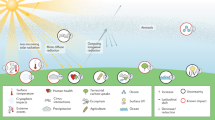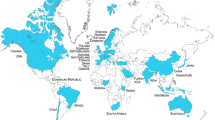Abstract
Increasing concerns about the narrowing window for averting dangerous climate change have prompted calls for research into geoengineering, alongside dialogue with the public regarding this as a possible response. We report results of the first public engagement study to explore the ethics and acceptability of stratospheric aerosol technology and a proposed field trial (the Stratospheric Particle Injection for Climate Engineering (SPICE) 'pipe and balloon' test bed) of components for an aerosol deployment mechanism. Although almost all of our participants were willing to allow the field trial to proceed, very few were comfortable with using stratospheric aerosols. This Perspective also discusses how these findings were used in a responsible innovation process for the SPICE project initiated by the UK's research councils.
This is a preview of subscription content, access via your institution
Access options
Subscribe to this journal
Receive 12 print issues and online access
$209.00 per year
only $17.42 per issue
Buy this article
- Purchase on Springer Link
- Instant access to full article PDF
Prices may be subject to local taxes which are calculated during checkout

Similar content being viewed by others
References
Geoengineering the Climate: Science, Governance and Uncertainty Science Policy Centre Report 10/09 (The Royal Society, 2009). Key first review of geoengineering proposals, their possible risks and uncertainties.
Vaughan, N. E. & Lenton, T. M. A review of climate geoengineering proposals. Climatic Change 109, 749–790 (2011).
Matthews, H. D. & Caldeira, K. Transient climate–carbon simulations of planetary geoengineering. Proc. Natl Acad. Sci. USA 104, 9949–9954 (2007).
Solar Radiation Management Governance Initiative Solar Radiation Management: The Governance of Research (The Royal Society, 2011).
Rayner, S. et al. The Oxford principles. Climatic Change http://dx.doi.org/10.1007/s10584-012-0675-2 (2013). First proposals for a governance framework for geoengineering research (now widely known as the 'Oxford Principles').
Climate Engineering: Technical Status, Future Directions and Potential Responses Report GAO 11–71 (US Government Accountability Office, 2011).
Renn, O., Webler, T. & Wiedemann, P. Fairness and Competence in Citizen Participation: Evaluating Models for Environmental Discourse (Kluwer, 1995).
Dietz, T. & Stern, P. (eds) Public Participation in Environmental Risk Assessment and Decision-Making (National Academies, 2008).
Fiorino, D. Citizen participation and environmental risk: a survey of institutional mechanisms. Sci. Technol. Hum. Val. 15, 226–243 (1990).
Rogers-Hayden, T. & Pidgeon, N. F. Moving engagement 'upstream'? Nanotechnologies and the Royal Society and Royal Academy of Engineering inquiry. Public Underst. Sci. 16, 346–364 (2007).
Marris, C. Public views on GMOs: Deconstructing the myths. EMBO Rep. 21, 545–548 (2001).
Pidgeon, N. F., Harthorn, B., Bryant, K. & Rogers-Hayden, T. Deliberating the risks of nanotechnology for energy and health applications in the US and UK. Nature Nanotech. 4, 95–98 (2009).
Burri, R. V. Coping with uncertainty: Assessing nanotechnologies in a citizen panel in Switzerland. Public Underst. Sci. 18, 498–511 (2009).
Bhattachary, D., Calitz, J. P. & Hunter, A. Synthetic Biology Dialogue(BBSRC, 2010).
Stirling, A. Deliberate futures: Precaution and progress in social choice of sustainable technology. Sustain. Dev. 15, 286–295 (2007).
Pidgeon, N. F., Hood, C., Jones, D. K., Turner, B. A. & Gibson, R. in Risk: Analysis, Perception and Management 89–134 (The Royal Society, 1992).
Renn, O. in The Social Amplification of Risk (eds Pidgeon, N. F., Kasperson, R. K. & Slovic, P.) 374–401 (Cambridge Univ. Press, 2003).
Experiment Earth: Report on a Public Dialogue on Geoengineering (NERC, 2010); available at www.nerc.ac.uk/about/consult/geoengineering-dialogue-final-report.pdf.
Jasanoff, S. Technologies of humility: Citizen participation in governing science. Minerva 41, 223–244 (2003).
Rip, A., Misa, T. J. & Schot, J. Managing Technology in Society: The Case of Constructive Technology Assessment (Pinter, 1995).
Guston, D. H. & Sarewitz, D. Real-time technology assessment. Technol. Soc. 24, 93–109 (2002). Philosophical discussion of the framework for and purposes of responsible innovation approaches.
Owen, R. & Goldberg, N. Responsible innovation: A pilot study with the UK Engineering and Physical Sciences Research Council. Risk Anal. 30, 1699–1707 (2010).
http://www.handsoffmotherearth.org/hose-experiment/spice-opposition-letter/
Corner, A. & Pidgeon. N. F. Geoengineering the climate: The social and ethical implications. Environ: Sci. Policy Sustain. Dev. 52, 24–37 (2010). Summarizes some of the ethical dimensions to geoengineering proposals and elaborates the case for early (upstream) public engagement.
Gardiner, S. M. Some early ethics of geoengineering the climate: A commentary on the values of the Royal Society report. Environ. Value. 20, 163–188 (2011).
Macnaghten, P. & Owen, R. Good governance for geoengineering. Nature 479, 293 (2011).
Corner, A. Pidgeon, N. & Parkhill, K. Perceptions of geoengineering: Public attitudes, stakeholder perspectives, and the challenge of 'upstream' engagement. WIREs Clim. Change 3, 451–466 (2012).
Chilvers, J. Sustainable Participation? Mapping Out and Reflecting upon the Field of Public Dialogue on Science and Technology (Univ. East Anglia & Sciencewise, 2010).
Irwin, A. & Wynne, B. Misunderstanding Science? The Public Reconstruction of Science and Technology (Cambridge Univ. Press, 1996).
Callon, M., Lascoumes, P. & Barthe, Y. Acting in an Uncertain World: An Essay on Technical Democracy (MIT Press, 2011).
Pidgeon, N. F. et al. Exploring early public responses to geoengineering. Phil. Trans. R. Soc. A 370, 4176–4196 (2012).
Buck, H. J. Geoengineering: Remaking climate for profit or humanitarian intervention? Dev. Change 43, 253–270 (2010).
Macnaghten, P. Researching technoscientific concerns in the making: Narrative structures, public responses, and emerging nanotechnologies. Environ. Plann. A 42, 23–37 (2010). Reviews the broad lessons learned from social scientists' study of public dialogue around earlier emerging technologies, many of which are likely to apply to SRM proposals.
Turner, B. A. & Pidgeon, N. F. Man-made Disasters 2nd edn (Butterworth-Heinemann, 1997).
Harremoës, P. et al. (eds) Late Lessons From Early Warnings: The Precautionary Principle 1869–2000 Copenhagen (European Environment Agency, 2001).
Hamilton, C. The Ethical Foundations of Climate Engineering (Australian National Univ., 2011).
Parkhill, K. & Pidgeon, N. F. Public Engagement on Geoengineering Research: Preliminary Report on the SPICE Deliberative Workshops Understanding Risk Working Paper 11–01 (Cardiff Univ. School of Psychology, 2011).
Bickerstaff, K., Lorenzoni, I., Pidgeon, N. F., Poortinga, W. & Simmons, P. Re-framing nuclear power in the UK energy debate: Nuclear power, climate change mitigation and radioactive waste. Public Underst. Sci. 17, 145–169 (2008).
Nielsen, A. P., Lassen, J. & Sandoe, P. Democracy at its best? The consensus conference in a cross-national perspective. J. Agr. Environ. Ethic. 20, 13–35 (2007).
Dryzek, J. S. & Tucker, A. Deliberative innovation to different effect: Consensus conferences in Denmark, France and the United States. Public Admin. Rev. 68, 864–876 (2008).
Philbrick, M. & Barandarian, J. The National Citizens' Technology Forum: Lessons for the future. Sci. Public Policy 35, 335–347 (2009).
Cobb, M. D. Creating informed public opinion: Citizen deliberation about nanotechnologies for human enhancements. J. Nanopart. Res. 13, 1533–1548 (2011).
Chilvers, J. & Macnaghten, P. The Future of Science Governance: A Review of Public Concerns, Governance and Institutional Response (Univ. East Anglia, Univ. Durham & Sciencewise, 2011).
Wynne, B. Public participation in science and technology: Performing and obscuring a political-conceptual category mistake. East Asian Sci. Technol. Soc. 1, 99–110 10.1215/s12280-007-9004-7(2007).
Lezaun, J. & Soneryd, L. Consulting citizens: Technologies of elicitation and the mobility of publics. Public Underst. Sci. 16, 279–297 (2007).
Brown, J. & Isaccs, D. The World Café: Shaping our Future through Conversations that Matter (Berrett-Koehler, 2005).
Pidgeon, N. F. & Henwood, K. L. in Handbook of Data Analysis (eds Hardy, M. & Bryman, A.) 625–648 (Sage, 2004).
Pidgeon, N. F. & Fischhoff, B. The role of social and decision sciences in communicating uncertain climate risks. Nature Clim. Change 1, 35–41 (2011).
Acknowledgements
The research was supported by the Engineering and Physical Sciences Council (EPSRC) and Natural Environment Research Council (NERC) through the Integrated Assessment of Geoengineering Proposals (IAGP) project grant (EP/I014721/1). Additional support was provided by the US National Science Foundation (NSF) through the Center for Nanotechnology in Society at the University of California at Santa Barbara (cooperative agreement SES 0938099) and the Leverhulme Trust (F/00 407/AG). We wish to thank M. Thomas for assistance with the workshops, K. Kuo, H. Hunt and M. Watson of the SPICE project, and the IAGP advisory panel for comments on materials. Any opinions, findings, and conclusions or recommendations expressed in this Perspective are those of the authors and do not necessarily reflect the views of the EPSRC, NERC or NSF.
Author information
Authors and Affiliations
Contributions
The study was conceived by N.P. and A.C. The detailed design and materials were developed by all authors. Data collection was conducted by K.P., N.P. and N.V., and the analysis by K.P. and N.P. N.P. wrote the paper with contributions from all other authors.
Corresponding author
Ethics declarations
Competing interests
The authors declare no competing financial interests.
Supplementary information
Supplementary Information
Supplementary Information (PDF 534 kb)
Rights and permissions
About this article
Cite this article
Pidgeon, N., Parkhill, K., Corner, A. et al. Deliberating stratospheric aerosols for climate geoengineering and the SPICE project. Nature Clim Change 3, 451–457 (2013). https://doi.org/10.1038/nclimate1807
Received:
Accepted:
Published:
Issue Date:
DOI: https://doi.org/10.1038/nclimate1807
This article is cited by
-
Public opinion about solar radiation management: A cross-cultural study in 20 countries around the world
Climatic Change (2024)
-
Public response to solar geoengineering: how media frames about stratospheric aerosol injection affect opinions
Climatic Change (2023)
-
Near-term climate risks and sunlight reflection modification: a roadmap approach for physical sciences research
Climatic Change (2022)
-
Exploring cross-national public support for the use of enhanced weathering as a land-based carbon dioxide removal strategy
Climatic Change (2021)
-
Mitigation of Arctic permafrost carbon loss through stratospheric aerosol geoengineering
Nature Communications (2020)



